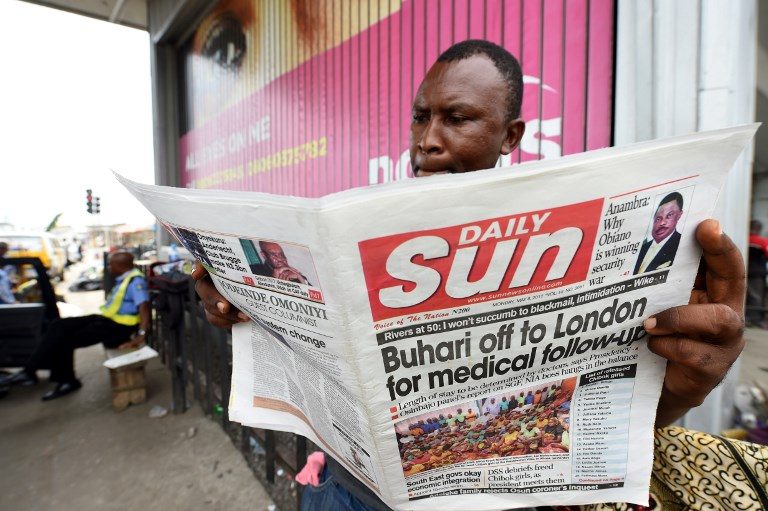SUMMARY
This is AI generated summarization, which may have errors. For context, always refer to the full article.

ABUJA, Nigeria – The president of Africa’s most populous nation was last seen in public two months ago and since the start of 2017, he’s been outside the country more than in it.
Nigeria’s Muhammadu Buhari left for London on May 7 to receive medical treatment for an undisclosed condition. No date has been announced for the 74-year-old’s return.
But unlike his previous medical leave in the British capital in January and February, no pictures have emerged of him at Nigeria’s diplomatic residence in the British capital.
Beyond official denials of rumors that he is terminally ill and even dead, questions about the head of state’s health have been met with a deafening silence.
Now the administration is being reminded of its 2015 election promise of greater openness and accountability, and stop keeping 180 million Nigerians in the dark.
“The government is actually taking people for granted,” said Idayat Hassan, director of the Centre for Democracy and Development in Abuja.
“Our president can’t be away for more than 50 days and nobody knows what’s wrong. When you add it together, he’s been gone for more than 100 days (this year),” she told Agence France-Presse.
“The vice-president is filling the position as acting president. But that doesn’t mean we shouldn’t know what’s happening with the president.
“We are entitled to know.”
Business of government
In Abuja, some 4,700 kilometers (2,965 miles) away from the president’s hospital bed, views differ about how Buhari’s absence has affected the day-to-day running of the country.
One senior civil servant grumbled that two high-profile anti-corruption investigations were gathering dust waiting for Buhari’s return.
The 7.44-trillion-naira ($24-billion/21-billion-euro) budget for 2017 was repeatedly delayed and only received presidential approval last month.
But other public servants see little disruption compared with 2010, when president Umaru Musa Yar’Adua fell ill and was treated abroad for several months before his death.
“I haven’t observed any vacuum created because presidential powers were properly transferred to the vice-president and that is why we have an acting president,” said one.
“There is virtually nothing that I used to do in this office that has been hindered as a result of the president being on sick leave in London.”
“I was here during Yar’Adua,” added another. “The running of government almost came to a halt because power was not transferred to the vice-president to act as president…
“Right now we don’t have that kind of situation.”
‘Total waste’
Buhari’s prolonged mid-term sick leave has allowed Nigerians to take stock of his time in office, two years after his landmark election victory against Goodluck Jonathan.
Certainly Buhari, a former military ruler, has galvanized the counter-insurgency against Boko Haram jihadists to the point where they are now a weakened force.
The jury is out on his much trumpeted anti-corruption crusade, which has seen many high-profile arrests but as yet no big name convictions.
To that can be added the crippling economic recession that has seen inflation spike and investment stall.
The government maintains Vice-President Yemi Osinbajo is implementing Buhari’s “change” agenda but doubts remain about the true extent of his power and influence.
Clement Nwankwo, head of the Policy and Legal Advisory Centre civil society group in Abuja, said Buhari’s illness had killed off any chance of meaningful change before 2019.
“The last two years have been a total waste of time and the next two years don’t look promising in terms of what can be achieved,” he said.
“The president came in and had no plans, no idea what to do, no agenda… Almost a year after the government was sworn in was spent preparing to begin to govern.”
Opposition ads
The weakened and faction-riven main opposition Peoples Democratic Party (PDP) have only belatedly started using Buhari’s absence as a political stick to beat the government.
A senior PDP figure this week took out a full-page newspaper advertisement highlighting “inconsistencies” in the approach of Buhari’s All Progressives Congress (APC) to the president’s health.
Ekiti state governor Ayodele Fayose contrasted the party’s previous objections to “medical tourism” and its public call for Yar’Adua to resign because of his illness.
Questions have been raised, too, about the true cost of keeping the presidential jet at London’s Stansted airport, the sum of his medical bills and who is paying.
For Hassan, Buhari’s absence lays bare the question that drives Nigerian politics: who’s really in charge? Elected politicians or their unelected advisors?
“Power and the quest for power starts immediately the last election is won… Nothing has actually changed,” she said. – Rappler.com
Add a comment
How does this make you feel?
There are no comments yet. Add your comment to start the conversation.